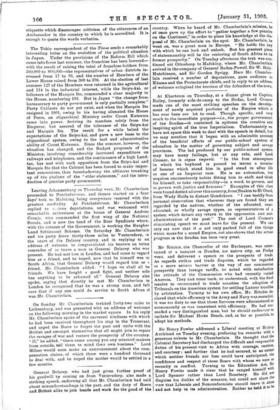The Tokio correspondent of the Times sends a remarkably interesting
letter on the evolution of the political situation in Japan. Under the provisions of the Reform Bill which came into force last summer, the franchise has been lowered— with the result of raising the total of franchise-holders from 500,000 to 800,000—the representatives of urban districts in- creased from 17 to 76, and the number of Members of the Lower House raised from 300 to 376. At the election of last summer 127 of the Members were returned in the agricultural and 114 in the industrial interest, while the Seiyu-kai, or followers of the Marquis Ito, commanded a clear majority in the House. numbering 192. But in Japan "the change from bureaucracy to party government is only partially complete." Party Cabinets do not yet exist, and when the Marquis Ito resigned in 1901, owing to his having alienated the House of Peers, an oligarchical Ministry under Count Katsuma came into power. deriving its mandate solely from the Emperor, but assured of the tolerance of the Seiyu-kai and Marquis Ito. The result for a while belied the expectations of the Seiyu-kai, and gave a new lease to the oligarchical system, owing to the tact and administrative ability of Count Katsuma. Since the summer, however, the situation has changed, and the Budget proposals of the Ministry, involving considerably increased expenditure on railways and telephones, and the continuance of a high Land. tax, has met with such opposition from the Seiyu-kai and Marquis Ito that the Cabinet has been forced to make impor- tant concessions, thus foreshadowing the, ultimate breaking up of the phalanx of the "elder statesmen," and the intro- duction of genuine party government.






















































 Previous page
Previous page